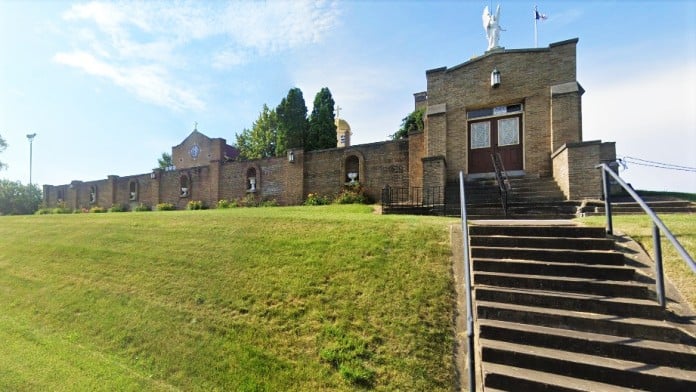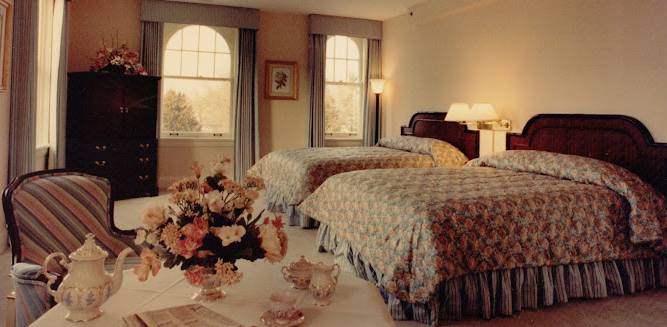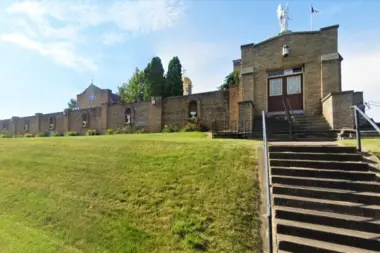Was told I wasn't an alcoholic, but needed to stay. They needed my insurance mo ey to pay for the addicts that stay there for free. Bed bugs. Mold, bad food, sex games after the staff leaves at night, same schedule they put in place in 2008 and it hasn't changed no wonder pe ...
About The Abbey Center
Clients with severe addiction symptoms or who have struggled with outpatient treatment previously may find inpatient treatment ideal. Clients are given a room for the duration of their stay, and all of their needs, including medical, are met by staff on site. Clients in the inpatient program receive 24 hour care and supervision from their support team.
Treatment is rooted in therapy focused on exploring the causes of addiction, how to cope, overcoming shame, and how thoughts influence behavior. Programs, which clients develop alongside their care team, include individual and group therapy, holistic experiential therapies, 12 step programs, motivational interviewing, and process groups. They also provide non denominational spiritual services.
The outpatient care program is best for clients who are coming from a place of stability and do not need close monitoring. Outpatient treatment uses the same treatment program modalities as the inpatient program but does not have clients live onsite to receive treatment. Outpatient care is provided on a flexible schedule.
PHP is a more intensive form of day treatment programs. Like outpatient care, clients do not live onsite to receive care. However, the schedule is more strict in order to deliver a structured environment for care.
The Abbey provides clients who have completed treatment several opportunities to remain in touch with the program to give and receive support. For example, they may return to engage with 12 step programs to support others in recovery. The Abbey also helps clients connect with local resources to help them continue with their recovery journey.
Facility Overview
Latest Reviews
Rehab Score
Gallery










Accepted Insurance
Other Forms of Payment
Private insurance refers to any kind of healthcare coverage that isn't from the state or federal government. This includes individual and family plans offered by an employer or purchased from the Insurance Marketplace. Every plan will have different requirements and out of pocket costs so be sure to get the full details before you start treatment.
Self-pay involves paying for treatment out of your own pocket. You can use savings or credit, get a personal loan, or receive help from family and friends to fund your treatment. If you don't have insurance or your insurance plan doesn't cover a specific program, self-pay can help ensure you still get the care you need.
Military members, veterans, and eligible dependents have access to specific insurance programs that help them get the care they need. TRICARE and VA insurance can help you access low cost or no cost addiction and mental health treatment. Programs that accept military insurance often have targeted treatment focused on the unique challenges military members, veterans, and their families face.
Private insurance refers to any kind of healthcare coverage that isn't from the state or federal government. This includes individual and family plans offered by an employer or purchased from the Insurance Marketplace. Every plan will have different requirements and out of pocket costs so be sure to get the full details before you start treatment.
Financing your treatment can make treatment more accessible. You'll work with your care provider to set up payment plans, including interest rates and repayment timelines. Financing options vary widely and not all programs offer them, so be sure to get the full details before enrolling in treatment. If you have insurance or other benefits, financing may help you cover your remaining out of pocket expenses.
Addiction Treatments
Levels of Care
12-step programs are addiction recovery models based on Alcoholics Anonymous (AA). A number of substance abuse programs (including some drug and alcohol rehab centers) use the 12 steps as a basis for treatment. Beginning steps involve admitting powerlessness over the addiction and creating a spiritual basis for recovery. Middle steps including making direct amends to those who've been hurt by the addiction, and the final step is to assist others in addiction recovery in the same way. 12-Step offshoots including Narcotics Anonymous (NA), Cocaine Anonymous (CA), Dual Recovery Anonymous (DRA), Sex and Love Addicts Anonymous (SLAA) and Gamblers Anonymous (GA).
Rehab aftercare programs support clients' reintegration into their home, workplace, and community following inpatient and residential treatment. They also promote long-term recovery for clients who may no longer be receiving outpatient treatment. Rehab aftercare services encompass a wide range of modalities and often include various medical, mental health, and social service programs. Case managers and care teams develop clients' customized service plans based on the client's evolving needs and recovery goals.
Residential treatment programs are those that offer housing and meals in addition to substance abuse treatment. Rehab facilities that offer residential treatment allow patients to focus solely on recovery, in an environment totally separate from their lives. Some rehab centers specialize in short-term residential treatment (a few days to a week or two), while others solely provide treatment on a long-term basis (several weeks to months). Some offer both, and tailor treatment to the patient's individual requirements.
Outpatient rehab programs are designed to support clients who are exiting inpatient treatment and for those who prefer to remain in their own homes during active recovery. Clients in outpatient care typically integrate treatment into their ordinary daily routine, including work and school schedules. Evening, night, and weekend therapy sessions, recovery training courses, and other outpatient services are widely available to accommodate clients' needs. Many outpatient rehabs also offer medication assisted treatment (MAT), including medication induction and maintenance.
Commonly referred to as "day treatment," a partial hospitalization program (PHP) is a short-term, intensive rehab option that provides structured treatment for those who don't require 24-hour care. PHP treatment can also be used as an alternative to inpatient hospitalization or as a "step-down" option. Insurance coverage for PHP treatment varies. Typically, PHP treatment requires a minimum of 20 hours a week and lasts an average of 90 days. PHP treatment often includes relapse prevention strategies, medication management, individual and group therapy, and other behavioral therapy interventions.
Intensive outpatient programs (IOP) offer high-level care for clients in early recovery or who are at an increased risk of relapse. Clients may also enroll in an IOP immediately following detox, enabling them to continue to work and to live at home. Clients attend multiple outpatient treatment sessions for a minimum of nine hours per week. Many intensive outpatient rehabs provide a variety of services, including psychotherapy, recovery education, and medication assisted treatment (MAT).
Treatments
The goal of treatment for alcoholism is abstinence. Those with poor social support, poor motivation, or psychiatric disorders tend to relapse within a few years of treatment. For these people, success is measured by longer periods of abstinence, reduced use of alcohol, better health, and improved social functioning. Recovery and Maintenance are usually based on 12 step programs and AA meetings.
Drug rehab in Iowa is available in many formats. A variety of inpatient and outpatient options provide programs that are tailored to individual needs, making recovery possible for everyone.
Many of those suffering from addiction also suffer from mental or emotional illnesses like schizophrenia, bipolar disorder, depression, or anxiety disorders. Rehab and other substance abuse facilities treating those with a dual diagnosis or co-occurring disorder administer psychiatric treatment to address the person's mental health issue in addition to drug and alcohol rehabilitation.
A combined mental health and substance abuse rehab has the staff and resources available to handle individuals with both mental health and substance abuse issues. It can be challenging to determine where a specific symptom stems from (a mental health issue or an issue related to substance abuse), so mental health and substance abuse professionals are helpful in detangling symptoms and keeping treatment on track.
Opioid rehabs specialize in supporting those recovering from opioid addiction. They treat those suffering from addiction to illegal opioids like heroin, as well as prescription drugs like oxycodone. These centers typically combine both physical as well as mental and emotional support to help stop addiction. Physical support often includes medical detox and subsequent medical support (including medication), and mental support includes in-depth therapy to address the underlying causes of addiction.
Substance abuse treatment is available in Iowa at drug and alcohol rehab facilities. Offering various levels of care, you can typically find an outpatient or inpatient program suited to your needs. Treatment involves evidence-based therapies and forms of counseling to develop healthy coping skills while overcoming addiction. With a focus on individualized treatment plans and recovery support, these programs aim to assist individuals in achieving sustainable sobriety and improved overall well-being.
Programs
Adult rehab programs include therapies tailored to each client's specific needs, goals, and recovery progress. They are tailored to the specific challenges adult clients may face, including family and work pressures and commitments. From inpatient and residential treatment to various levels of outpatient services, there are many options available. Some facilities also help adults work through co-occurring conditions, like anxiety, that can accompany addiction.
Young adulthood can be an exciting, yet difficult, time of transition. Individuals in their late teens to mid-20s face unique stressors related to school, jobs, families, and social circles, which can lead to a rise in substance use. Rehab centers with dedicated young adult programs will include activities and amenities that cater to this age group, with an emphasis on specialized counseling, peer socialization, and ongoing aftercare.
Clinical Services
Cognitive Behavioral Therapy (CBT) is a therapy modality that focuses on the relationship between one's thoughts, feelings, and behaviors. It is used to establish and allow for healthy responses to thoughts and feelings (instead of unhealthy responses, like using drugs or alcohol). CBT has been proven effective for recovering addicts of all kinds, and is used to strengthen a patient's own self-awareness and ability to self-regulate. CBT allows individuals to monitor their own emotional state, become more adept at communicating with others, and manage stress without needing to engage in substance abuse.
Addiction is often described as a “Family Disease”. Indeed, when alcoholism and addiction infiltrate families, usually everyone is affected in negative ways. At The Abbey, they view the families of their patients as their clients, as well. Every week, appropriate family members are invited to participate in Family Programming at The Abbey – including an Alanon support group.
Group therapy is any therapeutic work that happens in a group (not one-on-one). There are a number of different group therapy modalities, including support groups, experiential therapy, psycho-education, and more. Group therapy involves treatment as well as processing interaction between group members.
In individual therapy, a patient meets one-on-one with a trained psychologist or counselor. Therapy is a pivotal part of effective substance abuse treatment, as it often covers root causes of addiction, including challenges faced by the patient in their social, family, and work/school life.
Motivational Interviewing (MI) is a clinical approach to helping people with substance abuse issues and other conditions shift behavior in positive ways. It is more goal-oriented than traditional psychotherapy, as MI counselors directly attempt to get clients to consider making behavioral change (rather than wait for them to come to conclusions themselves). Its primary purpose is to resolve ambivalence and help clients become able to make healthy choices freely.
Creativity is inherently healing, and can help those in recovery express thoughts or feelings they might not otherwise be able to. Creative arts therapy can include music, poetry/writing, painting, sculpting, dance, theater, sandplay, and more. Unlike traditional art, the final product matters far less than the experience of creation and expression itself.
At The Abbey, healthy meals provide a variety of significant benefits. First, their meals are nutritious. Nearly all of their clients at The Abbey suffer from poor nutrition due to their addictive behaviors. Too often, their clients ingest too many calories through the consumption of alcohol – or avoid eating altogether as a symptom of their alcoholism or drug abuse. By preparing healthy meals, their clients begin to get the nutrition their bodies need. Second, their meals are opportunities for healthy social interaction. Clients eat communally, and get the opportunity to connect with one another while “breaking bread” together. In fact, their meals are generally served in the Café, which is open to the clients throughout the day as a healthy, sober “hang out”. Too often, their clients are accustomed to establishing their social lives around meeting in bars, taverns, and pubs. Instead, their Café at The Abbey resembles a neighborhood Starbucks – and serves as a model for clients as a social setting for making healthy connections with friends when they return to their home communities. Third, from research and their own experience, they know that many of their clients run the risk of cross-addictions. For example, some of their clients may suffer from eating disorders (such as anorexia, bulimia, etc.). Their healthy and structured meals help reinforce positive eating habits.
Trauma therapy addresses traumatic incidents from a client's past that are likely affecting their present-day experience. Trauma is often one of the primary triggers and potential causes of addiction, and can stem from child sexual abuse, domestic violence, having a parent with a mental illness, losing one or both parents at a young age, teenage or adult sexual assault, or any number of other factors. The purpose of trauma therapy is to allow a patient to process trauma and move through and past it, with the help of trained and compassionate mental health professionals.
Amenities
-
Yoga Studio
-
Private Rooms
-
Gardens
Staff & Accreditations
Staff

Joseph Lemon
Founder

Karen Relf, MSeD
Program Director
Accreditations

The Commission on Accreditation of Rehabilitation Facilities (CARF) is a non-profit organization that specifically accredits rehab organizations. Founded in 1966, CARF's, mission is to help service providers like rehab facilities maintain high standards of care.
CARF Accreditation: Yes

The Joint Commission, formerly known as JCAHO, is a nonprofit organization that accredits rehab organizations and programs. Founded in 1951, the Joint Commision's mission is to improve the quality of patient care and demonstrating the quality of patient care.
Joint Commission Accreditation: Yes
Contact Information
1401 Central Avenue
Bettendorf, IA 52722







